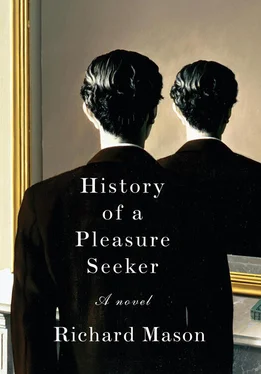Maarten was a fearless realist. He did not pretend to himself that he had gained the confidence of his American bankers in their gaudy offices. As he lay propped up on his pillows, contemplating the soft-boiled egg Hilde Wilken had brought him, he was annoyed by this failure — but it did not induce panic. He knew many wealthy men in Holland and was confident he could persuade them to lend him large sums. In his own country he had a greater renown and surer touch than would ever be the case in America.
He got out of bed, knelt beside it and said his prayers, in which he apologized sincerely for the waste of his American hotel. Then he opened his eyes and put this penitential mood aside. There was no retreating now, if he was to keep his wife and children in the luxury that was their natural atmosphere. The damned thing had cost more than ten million dollars already. It would probably cost another two million to finish, and then there would be staff salaries and interest to pay.… There was, perhaps, a further $500,000 to be borrowed from the Knickerbocker once his current credit was exhausted. This would be nowhere near enough.
Maarten had never had his collection valued, but it seemed to him that it would be wise to do so now, discreetly. He was too proud to introduce economies at Herengracht 605 and though he could postpone the building of his country place for another year, this would not release sufficient sums to cover his obligations. He had a great deal of furniture, far more than he needed, and he knew there were men across Europe who would pay high and confidential prices for the jewels of his collection. He needed someone he could trust to catalog and record them.
After his bath he rang for Mr. Blok and told him to ask Mr. Barol to wait on him at ten o’clock.
Piet Barol had already sketched several dozen objects in the house and chosen the finest pieces; and this was to Maarten Vermeulen-Sickerts a triumphant affirmation of his faith in the lad. As Piet showed him his drawings it seemed miraculous to Maarten that he should have anticipated his need, and fulfilled it in advance, without knowing anything of his difficulties.
Maarten’s preoccupation with his own salvation had left him alert to the ways in which God communicates with Man, and he read great significance in what Piet had done. It was vital no one should suspect him of valuing his treasures with an eye to raising money on them. His credit depended on the confidence of the public, which would be fatally undermined by the leaking of such news. Now there would be no need to hire a photographer whose loose talk might spoil everything. Turning the pages of Piet’s sketchbook he could have kissed him. His execution was as precise as anything a machine might achieve, but so much more refined.
As he accepted the book to look over later, the memory of his son’s behavior the night before recurred to him and seemed to complicate the message God had sent. “It is useful to me to have this little inventory,” he went on, more briskly, “and I should be glad if you would devote some time each day to continuing it. However”—he grew sterner—“I have a serious matter to discuss with you. Please sit down.”
To a conscience as tender as Piet Barol’s, this was a disturbing instruction. The life he would return to if he lost this man’s favor became vivid again, as it had not been in months. The shivering indignities of an outside toilet, his father’s joyless gloom, the cold winter nights, the tepid entertainments of the university clerks, their petty hatreds and intrigues rose up and seemed to choke him.
“I am extremely distressed to discover that my son is no better,” said Maarten. “We have greatly enjoyed having you in the house, but there has been no improvement in Egbert, and there must be improvement.”
Maarten intended to sound peremptory, but Piet heard the hopelessness in his voice. He looked at his face. It was plain that his employer had no idea of his true transgression. He began to float with relief, but at the same time he wished that Maarten was not Jacobina’s husband — because he longed to treat him worthily. It was no use pretending he would never touch his wife again. He had tried too many times to stop and never once succeeded. Here was an opportunity to atone for his repeated betrayals in another way.
“I will save Egbert for you, sir,” he said fervently. “I know I can, and I will.”
Piet Barol had never yet turned on Egbert Vermeulen-Sickerts the totality of attention he had so far devoted to every other member of his family. As he left Maarten’s office he felt exhilarated by the challenge of getting to the bottom of his mysteries. Piet had great faith in his ability to make people love him. He was not daunted by the layers of calcified sediment that separated Egbert’s humanity from the world beyond it.
Maarten had given him a green velvet box and asked him to sketch its contents; had told him, moreover, that he might ask to see anything in the house, whenever he had the inclination, so long as he undertook to draw it. To have the dread of the morning resolved so happily was wonderful. He passed beneath the statues of Paris, Aphrodite and Athena, taking the stairs two at a time and whistling. It was clear now that Jacobina would never confess. He was pleased that her reunion with her husband had not turned her into an hysterical penitent.
In the hall he encountered Mr. Blok and asked him breezily to fetch from the cabinet in the ballroom an object of such price he had never dared examine it: a jewel box, covered in golden vines and studded with pearls, that had been made for Catherine de Médicis.
“That would require Mr. Vermeulen-Sickerts’ express permission.”
“By all means seek it.” Piet waited in the hall while the butler went upstairs. When he returned, Piet placed the jewel box on top of the green velvet case and went into the house next door, feeling full of the joys of life.
This mood was broken abruptly by the music coming from the schoolroom — a sad, lost music, in no discernible key.
At his Bösendorfer, Egbert was engaged in a negotiation of the utmost delicacy over his handling of the red fire engine the evening before. He had risen at 4:00 a.m. and lain submerged to his ears in iced water as the sky lightened. Faced with a keyboard of black and white, he sometimes found he could communicate with his tyrants more subtly than words alone permitted. He had abased himself and asked their forgiveness. This had been withheld. He had begged for it and been told that toying with primary colors was an offense that merited prolonged punishment.
By the time Piet Barol entered his aunt’s house, Egbert was close to tears; and when his tutor opened the schoolroom door the Shadowers rebuked him for allowing their conference to be overheard. He broke at once into a frenetic rendition of the C Minor Prelude, taking care to play each note with identical force. The music’s repeating patterns blocked his bid for freedom at every turn, and Bach’s sly insinuation of a major note at the very end compelled him to begin again, and again, as Piet took a seat at the table and opened the velvet case.
Maarten had asked him to draw it because, of all his possessions, he cared for it the least. The box contained a set of Dresden figurines that had been childhood playthings of Catherine the Great, when she was plain little Sophia of Anhalt-Zerbst. The pirouetting maidens and courting couples did not please Piet Barol, but he set them in a line and began to draw, waiting for Egbert to stop.
Egbert did not stop. With each repetition of the prelude his shackles tightened, until he understood that his punishment was to be humiliated in front of his tutor. The impossibility of stopping made tears well in his pale blue eyes and spill down his cheeks, where they joined rivulets of sweat.
Читать дальше












